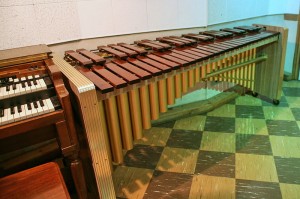No matter what our caliber of creativity is, art and music are important elements in our lives one way or another. Obviously there is enjoyment and pleasure imparted to audiences whom observe these creative and artistic products. But what is often overlooked and equally as important is the benefit gained by the artist producing these novelties. Educational scholars have confirmed the importance of children’s art and musical programs because thinking creatively and artistically unlocks ways our mind can process other types of scholastic information. Ben Hagen, a senior Economics student at the UPS, studied the importance of educational music and arts programs in schools and why it is a shame so many are being eliminated due to budget cuts.
HR: With school budget cuts, why are music and art programs typically the first to go?
BH: Fundraising bodies and individuals place lesser value on music and arts programs because they fall into non-academic categories. Math and science tends to attract more fundraising dollars because they are considered core subjects in school curriculums.

HR: What are the benefits of arts and music in children’s education?
BH: It helps kids unlock new and creative ways of thinking about academic concepts. For example, the ability to keep a beat or rhythm helps young kids count in intervals of 2, 4, or 8 (called sub-dividing). Scholarship has proven there are strong links between those who are musically and artistically inclined and mathematically proficient.
HR: Can you explain your econometrics analysis? What question are you trying to answer?
BH: My overarching goal was to find out how cutting music and arts programs will affect the quality of children’s education. My quantitative analysis’ dependent variable was Washington’s overall performance standardized test scores as a measure of the quality of education. The metric I used was the percentage of students passing the state’s 3rd grade reading exam.
HR: What independent variables do you think determine quality of children’s education?
BH: I figured there was a positive relationship (as factor increases, the other does too) between the following variables and education quality: fundraising levels, total revenue per pupil, expenditure by pupil, teacher salaries, and percentage of students involved in music programs. Another interesting variable I examined was the percentage of students eligible for reduced lunch, which I used as a measure of poverty and assumed families reporting less earnings didn’t have accessibility to music and arts programs.

HR: Why is your topic important?
BH: One scholar argues that equipping kids with mathematical skills will help them challenge injustice and “read and write the world with mathematics”. This point undervalues the fact that students come from completely different backgrounds and possess different literacies. There are so many dimensions to what it means to be educated; to change the world does not involve a single formula or path but a diversity of experiences that enrich your knowledge base. Harkening to the “read and write the world with mathematics” point, I say how can we read and write the world with music?
HR: Are you involved with arts and/or music?
BH: Music has always been part of my life but I didn’t become passionate about it until the 8th grade. In middle school I was in a marching band playing the marimba (it looks like a xylophone) and absolutely loved it. Without my musical interest, I don’t think I would be where I am today, with a tremendous appreciation for higher education coupled with devotion for the musical arts.

